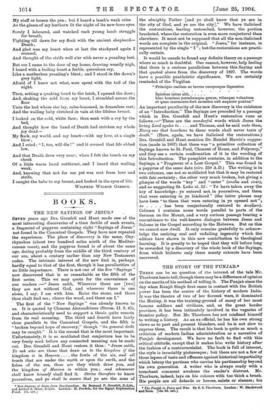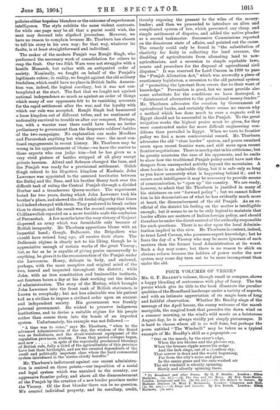THERE can be no question of the interest of the
tale Mr. Thorburn has to tell, though there may ben difference of opinion on the merits of his method of telling it. The Punjab since the day when Runjit Singh first came in contact with the British power has been the centre of the history of modern India. It was the theatre of two of her fiercest wars, it dominated the Mutiny, it was the training-ground of many of her most famous soldiers and civilians, and, as the great border province, it has been intimately involved in the vagaries of frontier policy. But Mr. Thorburn has not confined himself to writing a history. As an ex-official, he has his own strong views as to past and present blunders, and he is not slow to express them. The result is that his book is quite as mach a criticism of modern Indian administration as a narrative of Punjab development. We have no fault to find with this critical attitude, except that it makes him write history after the fashion of a controversialist. The book is full of interest, the style is invariably picturesque ; but there are not a few of those lapses of taste and offences against historical impartiality which betray the partisan who carries his partisanship beyond his own generation. A writer who is always ready with a trenchant comment awakens the reader's distrust Mr. Thorburn, indeed, lays on his colours with too thick a brush. His people are all dotards or heroes, saints or sinners ; his • The Punjab in Peace and War. By S. S. Thorburn. London; W. Blackwood and Bone. [12e. ed. net.]
to tell his story in his own way; for that way, whatever its Anita, is at least straightforward and individual.
The maker of the modern Punjab was Runjit Singh, who -performed the necessary work of consolidation for others to reap the fruit. Our two Sikh Wars were not struggles with a hostile Monarch, but rather with an antiquated order of society. Nominally, we fought on behalf of the Punjab's legitimate rulers ; in reality, we fought against the old military feudalism, which could have no place in British India. Annexa- tion was, indeed, the logical corollary, but it was not con- templated at the start. The fact that we fought not against national independence so much as against.an order of things which many of our opponents felt to be vanishing accounts for the rapid settlement after the war, and the loyalty with 'which our rule was accepted. Runjit Singh had hammered
a loose kingdom out of different tribes, and no sentiment of nationality survived to trouble us after our conquest. Perhaps, too, with a warrior race there could have been no better preliminary to government than the desperate soldiers'-battles -of the two campaigns. No explanation can make Moodkee
and Ferozeshah anything but what they were the most con- fused engagements in recent history. Mr. Thorburn may be wrong in his apportionment of blame—we leave the matter to
those experts who can judge him—but he has given us a
very vivid picture of battles stripped of all glory except private heroism. Aliwal and Sobraon changed the tune, and the Punjab was ready for a provisional settlement. Gula,b Singh retired to his ill-gotten kingdom of Kashmir, John Lawrence was appointed to the annexed territories between the Sutlej and the Bess, and his brother Henry took over the -difficult task of ruling the Central Punjab through a divided Durbar and a treacherous Queen-mother. The experiment lasted for two years, during which John Lawrence took his brother's place, and showed the old feudal oligarchy that times had indeed changed with them. They preferred to break rather than to change, and the result was the second campaign, when Chillianwallah repeated on a more terrible scale the confusion of Ferozeshah. A few months later the easy victory of Gujerat dispersed an army which was formidable only because of British incapacity. Mr. Thorburn apportions blame with an impartial hand ; Gough, Dalhousie, the Brigadiers who should have retired long ago, all receive their share. The Dalhousie regime is clearly not to his liking, though he is appreciative enough of certain works of the great Viceroy ; but, so far as he is capable of giving praise unreservedly to .anything, he gives it to the reconstruction of the Punjab under the Lawrences. Henry, delicate in body, and endowed, perhaps, with the more receptive and original mind of the two, toured and inspected throughout the district ; while John, with an iron constitution and businesslike instincts, sat fourteen hours a day at his desk working out the details -of administration. The story of the Mutiny, which brought John Lawrence into the front rank of British statesmen, is known to everybody; but not less admirable was his patient toil as a civilian to impose a civilised order upon an ancient and independent society. His government was frankly paternal government. He wished to preserve indigenous institutions, and to devise a suitable regime for his people rather than coerce them into the bonds of an imported system. Unfortunately, his example was not followed :—
" A time was to come," says Mr. Thorburn, "when to the advanced Administration of the day, the wisdom of the Board was as foolishness, and the strait-waistcoat equipment of the regulation provinces, wisdom. From that period collapse began, and now in spite of the repeatedly proclaimed blessings .of Britinh rule, fully a third of the agriculturists of this province lave lost their birthright, and are the sweated dependents of the small and politically impotent class whom the hard commercial system introduced in the 'sixties chiefly benefits."
Mr. Thorburn's indictment against our recent administra- tion is centred on three points,—our imposition of a social and legal system which was unsuited to the country, our
aggressive frontier policy, and above all the dismemberment of the Punjab by the creation of a new border province under the Viceroy. Of the first blunder there can be no question.
We created individual property, and its corollary, credit,
thereby exposing the peasant to the wiles of the money- lender; and then we proceeded to introduce an alien and complicated system of law, which prevented any cheap and simple settlement of disputes, and added the native pleader as a second taskmaster. Successive Commissions reported on the disastrous state of affairs, and pointed out the cause. The remedy could only be found in "the substitution of elasticity for fixity in collecting the land revenue, the disabling of agriculturists from alienating land to non- agriculturists, and a reversion to simple equitable laws, courts and procedure for the disposal of agricultural civil disputes." It was reserved for Lord Curzon in 1899 to pass the "Punjab Alienation Act," which was avowedly a piece of reactionary legislation, a reversion to the old paternal system of "protecting the ignorant from errors due to their want of knowledge." Prevention is good, but we must provide also some substitute for the conditions we have destroyed, a "disinterested alternative to the professional money-lender." Mr. Thorburn advocates the creation by Government of agricultural banks, and certainly there seems no reason why a method which has done much to cure a cognate evil in Egypt should not be successful in the Punjab. To the great irrigation works the highest praise must be given, for they were constructed under far more difficult engineering con- ditions than prevailed in Egypt. When we turn to frontier policy we find a more controversial record. Mr. Thorburn advocates the old "close border" system, and pours unmixed scorn upon recent frontier wars, and still more upon recent frontier negotiations. There is much point in his criticisms; but he greatly misstates the case of his opponents, and he omits to show bow the traditional Punjab policy could have met the dangers from unsuspected activity beyond the mountains. A close border is an admirable thing, but it is safe only so long as you know accurately what is happening behind it ; and to secure such intelligence it may be necessary to provide means of communication, to "open up" the country. We are ready, however, to admit that Mr. Thorburn is justified in many of his strictures on our "forward policy " ; but we cannot follow him in his denunciations of what he has evidently much more at heart, the dismemberment of the old Punjab. As an ex- official of the district his feeling on the matter is intelligible enough; but it seems to us to be only logical to maintain that border affairs are matters of Indian foreign policy, and should therefore bounder the direct control of the authority responsible for such questions. There is no slur upon the local Adminis- tration implied in this view. Mr. Thorburn is content, indeed, to trust Lord Curzon, who possesses expert knowledge ; but he fears the day of a Viceroy who may be more ignorant of such matters than the former local Administration at its worst. Such a day may come; but there is no reason to shirk an obvious reform because the holders of power under the new system may some day turn out to be more incompetent than under the old.
FOUR VOLUMES OF VERSE.*



























































 Previous page
Previous page